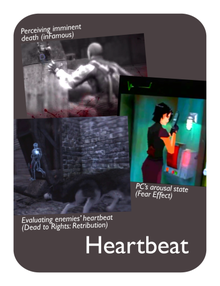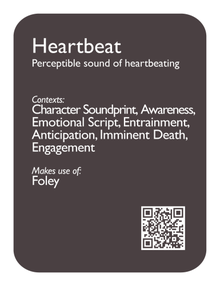Heartbeat

|

| |
| The card's front face | The card's back face |
Synopsis
| Perceptible sound of heartbeating. |
Relationships
Contexts:
Character Soundprint ![]() , Awareness
, Awareness ![]() , Emotional Script
, Emotional Script ![]() , Entrainment
, Entrainment ![]() , Anticipation
, Anticipation ![]() , Imminent Death
, Imminent Death ![]() , Engagement
, Engagement ![]() .
.
Makes use of:
Foley ![]() .
.
Description
The sound of the Heartbeat, or some variation that more or less consciously resembles it, is a common presence in games.
The use of Heartbeat-like stimuli is rooted on the principle of Entrainment and it has a great impact in terms of the Emotional Script. It is usually associated to situations when it is required an exceptionally high level of Awareness.
Heartbeat-like stimuli may be part of Character Soundprint or may integrate the interface in a non-diegetic manner.
For Entrainment to be more effective, the intensity (loudness) of the Heartbeat starts discreetly and gradually increases to match the drama, possibly to the point of becoming the dominant sound. When the kind of Awareness that is to be signaled is related to time (as in Hurry Up!), it is common that the rhythm also increases, as that time vanishes, emulating the process of increasing heartbeat rate of a person when facing an affliction.
Examples
Additional Comments
In the field of music, the emotional effect of tempo relative to the heartbeat has long been explored [pending ref].





